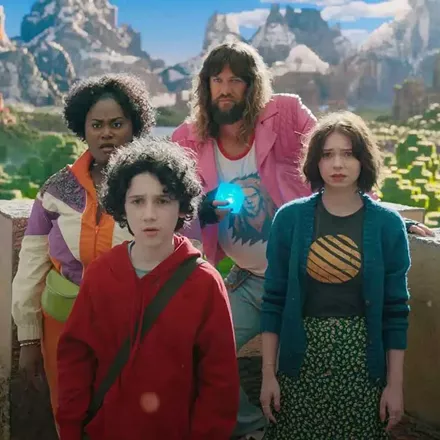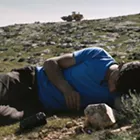The kid wakes up in a bed floating in the middle of space. The floor around him is all broken and jagged stone around the edges where the walls should be.
So he climbs out of his bed and walks over to the door — or where the door should be. As he approaches, stone blocks rise up from the distant ground below. Fitting themselves together, they form a pathway that the kid begins to walk along. The raspy-voiced narrator describes this, as if I can’t see it for myself.
Then the kid falls off. I don’t blame him — he’s walking along a floating stone pathway with only intermittent guardrails. It’s not safe. The narrator describes the kid’s fall and death without hesitation, as if they were expected parts of the game’s story. Then, as the kid pops back into existence on the stone path, the narrator says that he was only joking.
Bastion flows like this — the ground forms beneath the kid as he travels through his destroyed world, looking for clues as to what caused this calamity (and discovering why he is somehow able to restore things along the way). Like the paths that the kid follows, the narrator constructs a story that describes everything that happens, including wasting time.
But the kid can’t just head down any old pathway. Subtly yet intractably, the game directs his movements by building the world along predetermined paths. The only thing the player actually determines is when those paths are going to appear. Enemies pop up in the same places each time the game is played. And while the game’s story seems to have a sudden fork at the end, the choice is limited to that particular moment. The kid’s previous actions don’t seem to have determined anything.
Like Diablo, Bastion is viewed from the top down. And like Diablo, the action often becomes repetitive clicking. Fights are dynamic only insofar as they involve locating enemies and dodging them. Then it’s all about clicking to kill. After a while I started to wonder why the kid even bothered getting out of bed.
THE GOOD: There’s something rich and timeless about a handdrawn image that a 3D model just can’t duplicate. In Bastion, the flat, hand-drawn graphics create a color-saturated storybook setting that provides an innocent foil to the cynical narrator and the political strife of the storyline. Without resorting to childlike stupidity or Japanese cuteness, Bastion brings some charm and whimsy to an otherwise straightforward action game.
THE BAD: At $15, Bastion certainly qualifies as an inexpensive game, and I’m trying to play more of those. But at about eight hours, Bastion also qualifies as a short game. Granted, there are other brief games that sell for a lot more. (Dungeon Siege III, I’m looking at you.) But many of them have more varied, unpredictable gameplay than Bastion offers. (Dungeon Siege III, I’m looking at you.) Bastion is about $5 worth of gameplay and $10 worth of sights.
THE BOTTOM LINE: Bastion is beautiful, but the journey is bland.






















